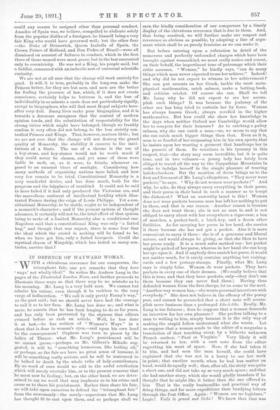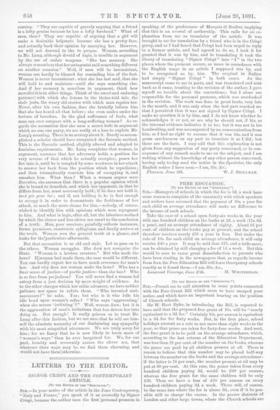IN DEFENCE OF WAYWARD WOMAN.
WITH a chivalrous reverence for our conquerors, the triumphant fair, one yet remarks that they have 4 ways' not wholly ideal." So writes Mr. Andrew Lang in the pages of the Illustrated London News, and further proceeds to illustrate those ways so that there may be no mistake as to his meaning. Mr. Lang is a very bold man. We cannot but admire his valour, even though it be reckless to the very verge of indiscretion. "We call it only pretty Fanny's way," as the poet said; but we should never have had the courage to call it so to her face. Mr. Lang has done so ; and what is more, he asserts that he has been longing to do so for years, and has only been prevented by the shyness that editors evinced before so rash an article. Well, he has done it at last,—he has written of "Woman's Ways" in a sheet that is dear to woman's eyes,—and upon his own head be the consequences ! Orpheus was torn to pieces by the ladies of Thrace : what Mr. Lang's punishment will be we cannot guess,—perhaps, as Mr. Gilbert's Mikado sug- gested, it will be "something humorous, like boiling oil," or perhaps, as the fair sex have no great sense of humour, it will be something really serious, and he will be Eientenced to be talked to death by the whole tribe of lady-contributors. By no word of ours would we add to the awful retribution ,which will surely overtake him, or to the present remorse that he must now be feeling ; but, on the other hand, we are deter- mined to say no word that may implicate us in his crime and cause us to share his punishment. Rather than share his fate, we will take upon ourselves to defend the "triumphant fair" from the unwomanly—the manly—aspersions that Mr. Lang has thought fit to cast upon them, and so perhaps shall we
earn the kindly consideration of our conquerors by a timely display of the chivalrous reverence that is due to them. And, that being resolved, we will further make our respect and reverence as obvious as possible, by adopting a line of argu- ment which shall be as purely feminine as we can make it.
But before entering upon a refutation in detail of the numerous and perfectly unfounded charges which have been brought against womankind, we must really notice and resent, on their behalf, the impertinent tone of patronage which their critic assumes. "Woman," he kindly says, "can do many things which man never expected to see her achieve." Indeed I and why did he not expect to witness to her achievement P She can put accents on her Greek, tackle the most meta- physical mathematics, catch salmon, make a betting-book, and criticise cricket. Of course she can. Shall we tell Mr. Lang why he did not expect to see her accom- plish such things It was because the jealousy of the other sex has long tried to restrain her by force. Woman has always known Greek ; always revelled in the higher mathematics. But how could she show her knowledge in the days when neither Oxford nor Cambridge would allow her to compete for their honours P As to catching a paltry salmon, why she can catch a man,—no, we mean to say that she can catch much bigger things than that. Even as it is, man is so fearful of her surpassing him in his own sports, that he insists upon her wearing a garment that handicaps her in the pursuit of them. So vexatious is his tyranny in this respect, that—the story may seem incredible, but it is quite true, and in two volumes—a young lady has lately been obliged to travel all the way to the Carpathian Mountains in order to indulge herself in the simple pleasure of wearing knickerbockers. But the mention of dress brings us to the first and foremost of Mr. Lang's allegations. "They never wear pockets," he says. "Why do not women wear pockets " And why, he asks, do they always carry everything in their purse, and their purse in their hand in such a manner as to tempt the dishonest? What an unworthy taunt is this ! Woman does not wear pockets because man has left her nothing to put in them, and that is one reason. Another reason is because she does not want them ; she is not as man is, and is not obliged to carry about with her everywhere a cigar-case, a box of matches, a pocket-book, a latch-key, and a dozen other futilities. As for carrying her purse in her band, she carries it there because she has not got a pocket. Also it is more convenient to carry it there : she is of a generous and liberal nature, and would always be giving, so that she likes to have her puree ready. It is a much safer method too : her pocket might be picked of her purse, whereas in her hand she can keep her eye upon it. And if anybody does snatch her purse, it would not matter much, for it rarely contains anything but visiting. cards and a few postage-stamps. Finally, what Mr. Lang says is simply false. Women do wear pockets. They have pockets in every one of their dresses. (We really believe that this is true, and that they have pockets, only—they don't use them because they can never find them.) Having thus defended woman from the first charge, let us come to the next. "Another way woman has,—she wants personal interviews with everybody." She does not believe in the efficacy of the penny post, and cannot be persuaded that a short note will accom- plish more business than a prolonged tete-a-tete. Really, Mr. Lang is too fatuous ; does he suppose that a woman demands an interview for her own pleasure ? She prefers talking to a man to writing to him, simply because it is the only way of making the stupid fellow understand what she wants. Let us suppose that a woman sends to the editor of a magazine a translation of that touching story, by a hitherto unknown French author, "Paul et Virginia." Very likely it will be returned to her, with a curt note from the editor regretting his want of space. Now, if she had taken it to him, and had seen the man herself, she could have explained that she was not in a hurry to see her work in print; that another month, when he had leas matter on hand, would do equally well ; that, after all, the story was quite a short one, and did not take up so very much space; and that she had another story, which she would gladly translate if he thought that he might like it better than the one offered to him That is the really businesslike and practical way of doing things, and far more expeditious than bandying letters through the Post Office. Again : "Women are no logicians." Logic! Voila le grand mot ldehe ! We knew that that was coming. " They are capable of gravely arguing that a friend is a lofty genius because he has a lofty forehead." What of men, then? They are capable of arguing that a girl will make a desirable helpmate because she has a pretty face, and actually back their opinion by marrying her. However, we will not descend to the tee. vogue. Woman, according to Mr. Lang, although devoid of logic, is terrible in argument by the use of unfair weapons. "She has memory. She always remembers that her antagonist said something different on another occasion." Well, if man will be inconsistent, woman can hardly be blamed for reminding him of the fact. Woman is never inconsistent : what she has last said, that she will hold to and maintain—until she says something else. And if her memory is merciless in argument, think how mercifulit is in other things. Think of the sweet and enduring patience: with which she listens to the thrice-told, tale, the stale jests, the weary old stories with which man regales her. Never, after his own fashion, does she brutally inform him that she has hoard all that before; she oven smiles under the torture of boredom. In the glad sufferance of fools, what man can ever compare with a long-suffering woman? As re- gards the accusation that she uses a secret bete in argument which no one can parry, we are really at a loss to explain Mr. Lang' s meaning. There is no secrecy about it. Surely so accota- pliehed. a scholar should have recognised the Socratic method. This is the Socratic method, slightly altered and. adapted to feminine requirements. Mr. Lang complains that woman, in argument, assumes that her adversary holds a position the very reverse of that which he actually occupies ; pours her fire into it, until he is tempted by some weakness in her attack to answer her back from the position which he repudiates ; and then triumphantly convicts him of occupying it, and smashes him. What then P When a woman argues more 'Socratic°, she assumes that there is a popular opinion which she is bound to demolish, and which her opponent, in that he differs from her, must necessarily hold ; if he does not hold it, Met pis pour lui ; and. if, not holding it, he is fool enough to occupy it in order to demonstrate the feebleness of her attack, so much the more shame for him,—nobody, of course, wished to identify him with opinions which were repugnant to him. And what is logic, after all, but the laborious method by which the slower and less clever sex crawl to the conclusion of a truth. Man, poor creature, painfully collects instances, forms premisses, constructs syllogisms, and finally arrives at the truth. Woman sees the general truth at a glance, and looks for the7particulars afterwards.
But that accusation is se old and stale. Let us pass on to the others, Woman smuggles. She doe not recognise the State. "Woman is a lawless creature." But who made the laws ? Ifiwoman had. made them, the ease would be different. You can hardly expect her to have much reverence for man's law. And why does not woman make the laws ? Who has a finer sense of justice—of poetic justice—than she has ? Who is so free from prejudices ? You will never find a woman led astray from a just decision by mere weight of evidence. As to the other charges which her critic advances, we have neither patience nor space to refute them. "Who invented anti- macassars P" he asks. Yes ; but who is it who lolls his idle head upon woman's sofas ? "Who says aggravating,' when she means irritating '?" Well, woman does; but it is the aggravation of man's irritations that has driven her into doing so. But enough It really grieves us to treat Mr. Lang after this fashion, but we are sure that he will see him.
self the absolute necessity of our disclaiming any sympathy with his most misguided utterances'. We are truly sorry for"
him ; for we fancy that he is now likely to learn more of "woman's ways" than he ever bargained. for. We, for our part, humbly and reverently assure the clever sex, that whatever their ways may be, we find them charming, and would. not have thein:otherwise.



































 Previous page
Previous page